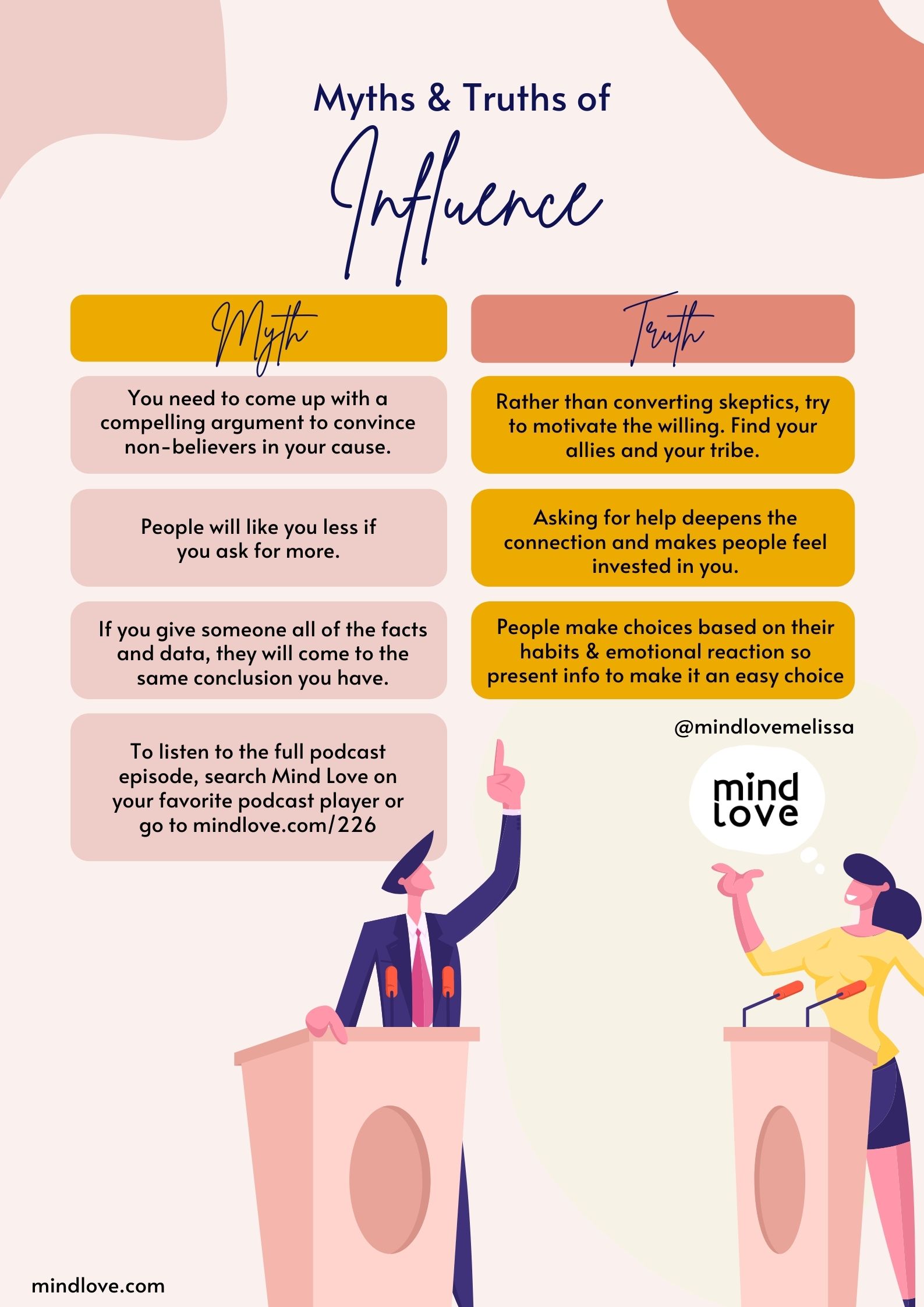
We all have a voice. And, whether we realize it or not, we are using that voice every day to create change around us. Whether we’re influencing our friends and family or advocating for a cause we believe in, our voices can have a powerful impact. There are a lot of misconceptions about influence, so in this blog post, we will address a few of those misconceptions and discuss tips for using your voice to become more influential.
What does it mean to be influential?
The word “influencer” makes a large portion of the population cringe at this point, but let’s not let “influence” lose its meaning. Influence is “the capacity to have an effect on the character, development, or behavior of someone or something, or the effect itself” (Encyclopedia.com). When you’re influential, people are drawn to your message and want to hear more from you. They may not always agree with you, but they respect your opinion and are willing to listen. Being influential doesn’t mean you’re always right, but it does mean you’re confident in your convictions and can articulate your ideas in a way that resonates with others.
It’s important to distinguish influence from manipulation. Influence is not about forcing your opinions on others. Rather, it’s about using your voice to share your ideas and values in a way that inspires others to take action. Think about all of the people who have fought for change throughout history. They didn’t do it alone, but the power of their voices was an essential catalyst for mobilizing the masses. From Martin Luther King Jr. to Mahatma Gandhi to Eleanor Roosevelt, it’s clear that the influence of one person’s voice can create real and lasting change in the world.
So what is it that makes some speeches impactful enough to motivate entire nations to take action? And is the power of influence a skill that anyone can learn? To truly understand how one becomes influential, it’s helpful first to understand some of the common misconceptions people have about how to influence others.
Common misconceptions about influence
Zoe Chance, teacher, researcher, and bestselling author of “Influence Is Your Superpower”, outlines three common misconceptions people have about being influential.
I need to come up with a compelling argument to convince non-believers of my cause.
It’s common for us to assume that we need to convert everyone to our cause to actually make a change. “But that isn’t the way that influence generally works,” Professor Chance explains, “If you want to get stuff done in the world, you are spending far less time trying to convert skeptics and far more time trying to motivate the willing, trying to activate your allies.” In fact, trying to force our opinions on people who aren’t the slightest bit receptive can often do more harm than good by causing them to feel attacked and alienated.
People will like me less if I ask for more.
Have you ever struggled to ask for help? The truth is that few people feel comfortable asking for help in all situations. We don’t want to inconvenience the people we care about. We don’t want to appear too needy or greedy because we’re afraid our friends and loved ones won’t like us if we ask for too much. But Zoe Chance argues that “people’s liking for us has to do with how we treat them, and it doesn’t have to do with what we’re asking for.”
Think about the last time someone asked for your assistance in an area of life where you feel confident. Did it feel good to be considered the expert on this topic? Did you feel compelled to share your wisdom? I’m sure you felt a deep sense of satisfaction when you successfully guided that person to clarity or a beneficial solution.
“Sometimes even asking somebody for a lot can be a compliment, and it can be inspiring, and that can lead to that person respecting and admiring you more,” says Professor Chance.
If I give someone all of the facts and data, they will come to the same conclusion I have and make the “right” choice.
“We think that we should just give them the facts, the information, the data, and they will make the right decision, and we shouldn’t have to ‘do persuasion’,” Zoe Chance explains. “We shouldn’t have to try to influence them. We just give them the information they need, and they will make the right choice. But that’s vastly misunderstanding how decisions are actually made.”
As I’m sure you know, there are plenty of intelligent people who, when presented with the same facts, will come to different conclusions. So what’s really going on? It turns out that our emotions play a more significant role in decision-making than we realize.
We like to tell ourselves that we rely on logic to make our decisions, but when considering two options, we tend to go with the one that feels best in the moment, even if it’s not necessarily the smartest choice. We also give more weight to information that confirms our existing beliefs and less weight to information that contradicts them. So how do we use this knowledge to become more influential?
Influence depends on effective communication
If you want to become more influential, start by working on your communication skills. Effective communication isn’t just about using the right words. It’s also about using the right tone, facial expressions, and body language. If you can speak with confidence and conviction, people will be more likely to listen to you and be inspired by your message. On the other hand, if you’re unsure of yourself or use language that is difficult to understand, people will be less likely to take you seriously.
One simple and effective way to convey confidence using your voice is to eradicate what Zoe Chance calls “diminishers” from your vocabulary. Diminishers are those little phrases that we subconsciously spew before getting to the point of our statement or request. For example, “This is probably a stupid idea but…” or “I don’t know, I think we should…” It’s as if we think diminishers make us sound more humble or less demanding, but in fact, they make it harder for the other person to understand us.
“When you have made a request in some meandering unclear way,” says Zoe Chance, “And the other person doesn’t give you that thing that you wanted, you can be frustrated with them, you can want to take it out on them, you can easily take it personally, but the reality often, is that they didn’t actually understand what was going on. They may not really know what it was that you were requesting.”
People respond to direct communication, especially when phrased as a question. If you want someone to be interested in what you have to say, skip the diminishers and say something like, “Hey do you want to hear a crazy idea?” You can hear already how differently that question lands compared to a statement led with a diminisher.
A calm voice conveys confidence
In addition to using direct communication, studies show that people are more likely to respond to a voice that is calm and relaxed. This is because when we hear a voice that is tense or anxious, it triggers our fight-or-flight response and makes us less receptive to what the other person is saying.
“We feel more confident and trusting in people who speak in their natural low register because that’s a sign of being relaxed,” Says Zoe Chance, “It’s a sign that you’ve relaxed your vocal cords and your diaphragm and your lungs, and being relaxed is a sign of confidence.” She goes on to explain that it’s not “the deeper the voice, the more confidence perceived” but rather speaking in your own natural lower register will express conviction in your message.
Ease influences action
Once you have gained the trust and confidence of your audience, if you want your message to be influential, you need to make it easy for them to act. People are much more likely to do something if it requires little effort on their part. “Ease is a bigger factor influencing our behavior than literally everything else – bigger than intention or motivation. Things like satisfaction, price, quality, [are] all trumped by ease,” Professor Chance tells us.
If you want someone to vote, make sure they know where their polling station is and that it’s easy to get to. If you want someone to sign a petition, send them a link that they can easily click on and add their name. If you want someone to donate money, set up a Crowdrise account and share the link. The easier you make it for people to take action, the more likely they will do it.
“One thing you want to keep in mind for anything you want to help somebody do is to look for a moment of truth, which is these contexts or situations in which they are most likely to be open to influence. And then you try to make it as easy as possible in that moment if you can,” Advises Chance.
An easy first step to becoming more influential
Now that we’ve examined some of the common misconceptions around influence and how to use your language and tone of voice to be more influential, let’s talk about an easy action you can take to begin implementing this knowledge. “One of the best ways to become someone that people want to say ‘yes’ to,” says Zoe Chance, “Is for you to get really comfortable saying ‘no’.”
If you are someone who says “yes” to everything, it’s a sign that either you don’t have priorities or that you don’t honor your priorities. People respect and want to follow people who are crystal clear on what they stand for. If you’re not exactly sure what you stand for, you may want to do a values exercise. Gaining clarity on your values makes it easy to prioritize because you know what matters most to you.
The next time someone asks you to do something, before you say “yes”, take a pause and ask yourself if it aligns with your values. If it’s not, then say “no”. It may feel uncomfortable at first, but the more you practice saying “no” to things that don’t align with your values, the easier it will become and the more influential you will be.
Zoe Chance suggests a “24-hour ‘no’ challenge”. For a whole day, you say “no” to every single request (short of making life-ruining decisions). It’s a great way to practice saying “no” and bring awareness to situations or people you may be subconsciously saying “yes” to without first considering how it may or may not align with your priorities.
Professor Chance explains that when you are comfortable saying ’no’, you consequently become more comfortable with others saying “no” to your requests. This level of comfort releases the pressure on the other person, and often they feel more inclined to say “yes”.
Clarity and authenticity are essential to influencing change
When it comes to using your influence to create positive change, clarity and authenticity are key. If you aren’t clear on what you are asking for, how can you expect anyone else to be? Similarly, if you don’t whole-heartedly believe in your message, how can you expect others to believe in it? When you speak from your heart, people will notice and respond. If you stretch the truth or are unsure of what you believe in, that too will be obvious.
So as you begin exploring the power of your voice and using it to influence others, keep these principles in mind:
- Share your message with those who are interested in your cause
- Get comfortable asking for help
- Appeal to emotions first
- Use clear and direct communication
- Use a calm, relaxed voice
- Make it easy for your audience to take action on your message
- Learn when and how to say “no”
- Speak your truth authentically
If you wish to make an impact, you will need to rely on your influence. Speak up for what you believe in, and don’t be afraid to stand up to those who disagree with you. You never know how far your words will travel or how much they’ll resonate with others. So use your voice, and use it wisely. It just might be the most powerful tool you have for creating positive change in the world.
Share This





